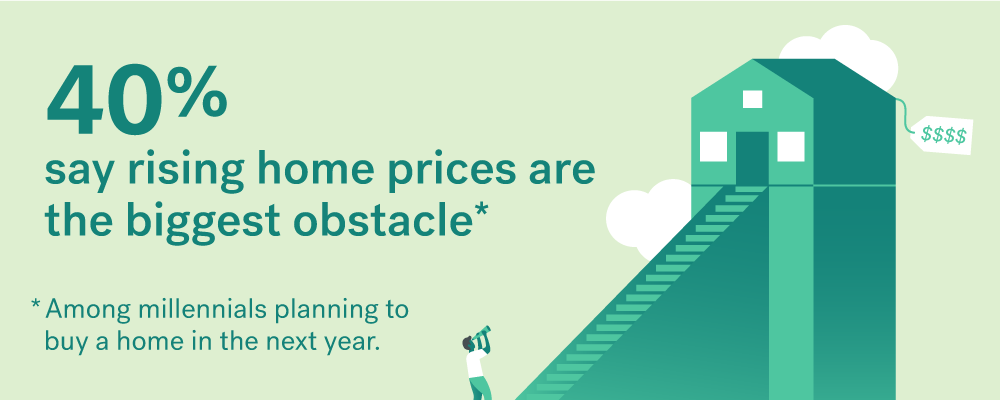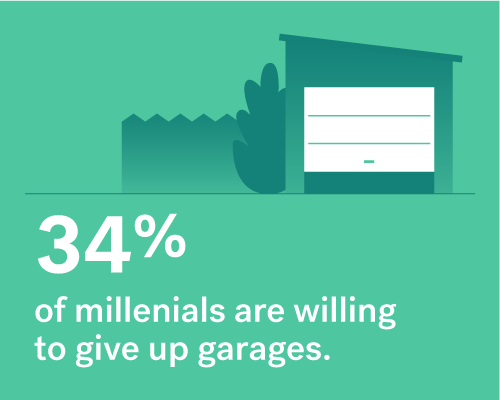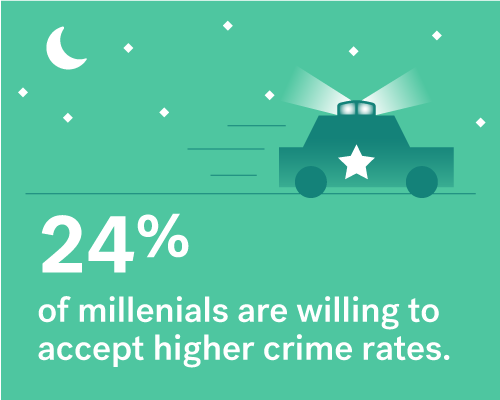The American Dream of homeownership is alive and well this spring—but the housing market isn’t playing nice. Prices keep creeping higher, and inventory continues to dry up.
For millennials it’s especially tough. Members of this generation (ages 20-36) make up the biggest share of active buyers in the market. Amid intense competition they’re being forced to make hard choices either in what they find in a home or the neighborhood it’s in.
Our inventory report last quarter found that home seekers in the starter home category are bearing the brunt of the housing market beatdown—entry-level homes are becoming scarcer and pricier, but also smaller, older, and of worse quality. In a market that’s tough for everyone, millennials—the youngest and largest homebuying generation—also face the most obstacles, and most often have to put their homebuying plans on hold. Put between a rock and a hard place, these homebuyers are being forced to make compromises on their home purchase.
This homebuying season, Trulia commissioned a survey, conducted online by The Harris Poll of more than 2,000 Americans age 18 and older, to understand the hard decisions home shoppers face. We found that:
- Nearly nine in 10, (86%), of millennials plan to buy a home. Of these prospective homebuyers, 35% plan to purchase a home within the next year, and 57% plan to purchase in the next two years.
- However, the vast majority of millennials (87%) are encountering obstacles that are delaying their homebuying plans at this time, more than any other age group (68% of Gen Xers, ages 37-53, and 47% of boomers, ages 54-73). In fact, 98% of millennials planning to buy in the next year say they’ve encountered obstacles that are keeping them from buying a home,most often due to rising home prices (40%), saving enough for a down payment (31%), and poor credit history (26%).
- Millennials are facing problems that older generations may not have had to deal with. Among millennials who ever had plans to buy a home, not having a stable job (17%) and student debt (15%) are two obstacles that have hindered their homebuying decisions, and they are over twice as likely to have experienced these obstacles compared to Gen Xers (7% and 6%, respectively) and boomers (7% and 1%, respectively).
- Faced with these pressures, millennials are more likely than older generations to be willing to consider trade-offsin both the home and neighborhoodduring their home search. 84% say that they’d be willing to give up one or more home features (compared with 78% of Gen Xers and 65% of boomers), and 89% say they’d be willing to give up one or more neighborhood features (compared with 81% of boomers).
Buyers Under Pressure
It’s hard out there for a homebuyer. Unsurprisingly, financial concerns rank at the top of the list of homebuyer obstacles. Saving enough for a down payment (34%), rising home prices (33%), and poor credit history (21%) are top of mind for most shoppers in the market, but young homebuyers are especially feeling the pressure of recent market trends.
Millennials are the largest prospective homebuying generation, and also the generation most likely to be planning to buy a home soonest. 86% plan to buy a home (compared with 71% of Gen Xers and 52% of boomers), and of those, 57% plan to do so within the next two years and 35% plan to buy in the next year (compared with 22% of Gen Xers and 12% of boomers who plan to buy in the next year). This shorter time horizon also means this generation may be sensitive to recent increases in prices. Almost all (98%) millennials planning to buy in the next year have encountered obstacles that are keeping them from buying a home, with rising home prices as the most common culprit, affecting 40% of this population.

| Which of the following are among the biggest obstacles that are keeping you from buying a home at this time? | |
| Millennials Planning to Buy in the Next Year | |
| Rising home prices | 40% |
| Saving enough for a down payment | 31% |
| Having a poor credit history | 26% |
| Qualifying for a mortgage | 25% |
| Not having a stable job | 22% |
| Not being able to find a home I like | 21% |
| Rising mortgage rates | 19% |
| Increased tax burden due to the recent tax reform | 15% |
| Unable to pay off existing debt (excluding student debt) | 13% |
| Unable to pay off student debt | 9% |
| Getting outbid on a listing | 6% |
| None | 5% |
| Other | 3% |
Note: Multiple responses possible.
Generational Gap
Millennials also are the generation most likely to have ever had to put their homebuying plans on hold—79% say they have. Compare that to 64% of Gen Xers and only 48% of baby boomers. Why are millennials having such a harder time?
A look at generational differences in homebuying obstacles sheds some light on the millennial plight. Some homebuying difficulties are timeless—a similar proportion of millennials, Gen Xers, and boomers have put their homebuying plans on hold because they couldn’t find a home they liked, between 17 and 20%. Other difficulties, however, are uniquely skewed toward

millennials. Not having a stable job (17%) and being unable to pay off student debt (15%) are two problems disproportionately faced by millennials, at rates over double those of older generations. As the generation that came into their adult years during the recession, millennials seem to have struggled to find their financial footing in the face of labor market downturns and the burden of student debt.
| Which of the following have ever caused you to put your homebuying plans on hold? | |||
| Millennials | Gen X | Baby Boomers | |
| Saving enough for a down payment | 36% | 32% | 21% |
| Rising home prices | 27% | 26% | 17% |
| Having a poor credit history | 25% | 21% | 9% |
| Not being able to find a home I like | 18% | 17% | 20% |
| Rising mortgage rates | 17% | 12% | 11% |
| Not having a stable job | 17% | 7% | 7% |
| Qualifying for a mortgage | 16% | 17% | 9% |
| Unable to pay off existing debt (excluding student debt) | 16% | 14% | 7% |
| Unable to pay off student debt | 15% | 6% | 1% |
| Getting outbid on a listing | 10% | 7% | 5% |
| Increased tax burden due to the recent tax reform | 9% | 4% | 4% |
| Other | 4% | 7% | 9% |
| None | 10% | 23% | 39% |
Note: Among Americans that have ever had plans to buy a home. Multiple responses possible.
A smaller share of boomers have struggled with the biggest obstacles faced by millennials and Gen Xers—in fact, 39% have never had to put their homebuying plans on hold. Down payments and rising home prices have put boomer homebuying plans on hold at rates about 10% lower than both millennials and Gen Xers. Compared to younger generations, homebuying for the boomer generation appears to have been a less difficult affair.

Home Search Trade-Offs
Perhaps with tight budgets and few choices, millennials are the generation more likely to be willing to consider trade-offs in their home and neighborhood. A hearty 84% of millennials would be willing to give up a home feature to live in their ideal neighborhood, and 89% would be willing to give up a neighborhood feature for their perfect home. The older the generation, the less likely they are to be willing to compromise on the home and neighborhood features they’re looking for. About a third, 35%, of boomers and 22% of Gen Xers say they wouldn’t compromise on any home features while looking for a home in their ideal neighborhood, and 19% of boomers wouldn’t give up any neighborhood features for their ideal home.
Garages are the number one feature to go when it comes to a new home for millennials, with 34% saying they are willing to give that up for their ideal neighborhood. Only 22% of Gen Xers and 15% of boomers say the same. Millennials are the most urban generation—40% say they live in an urban area, compared to 25% of Gen Xers and 21% of boomers—which means they likely are looking for homes in areas with more transit options and don’t necessarily need a car. Millennials are also willing to give up a recently updated kitchen (32%) and square footage (30%). Preferences between Gen Xers and boomers line up more closely than with millennials. Both Gen Xers and boomers would most rather give up square footage (31% each), followed closely by a recently updated bathroom (29% and 24%, respectively), and a recently updated kitchen (29% and 22%, respectively).
| If you were looking for a new home, which of the following home features would you be willing to give up if you could live in your ideal neighborhood? | |||
| Millennials | Gen X | Baby Boomers | |
| Garage | 34% | 22% | 15% |
| Recently updated kitchen | 32% | 29% | 22% |
| Square footage | 30% | 31% | 31% |
| Storage space | 29% | 21% | 14% |
| Recently updated bathroom | 28% | 29% | 24% |
| Yard | 26% | 25% | 21% |
| A bedroom | 26% | 15% | 11% |
| A bathroom | 20% | 13% | 7% |
| Other | 5% | 6% | 3% |
| None | 16% | 22% | 35% |
Note: Multiple responses possible.
As with home trade-offs, millennials are the generation more likely to be willing to consider neighborhood trade-offs. A significantly higher proportion of millennials (89%) would give up neighborhood features for their ideal home than boomers (81%). The most stark difference between millennials and older generations in terms of preferences in neighborhood tradeoffs is the younger generation’s relative willingness to forego a low crime rate for their perfect home. Nearly one in four, 24%, of millennials would be willing to accept higher crime rates for their ideal home, while only 15% of boomers said the same. But one thing all three generations can agree on: neighborhood activities, such as clubs and block parties, is the top neighborhood feature that would get the axe in their home search (35%, 36%, and 42%, respectively).
| If you were looking for a new home, which of the following neighborhood features would you be willing to give up if you could live in your ideal home? | |||
| Millennials | Gen X | Baby Boomers | |
| Neighborhood activities (e.g., clubs, groups, block parties, festivals) | 35% | 36% | 42% |
| Access to parks and/or trails | 30% | 26% | 27% |
| Neighbors who share the same political and/or social values as myself | 30% | 25% | 29% |
| Good schools nearby | 27% | 28% | 37% |
| Short commute to work | 27% | 30% | 29% |
| Neighbors that you can get along with/socialize with | 26% | 20% | 16% |
| Low crime rate | 24% | 21% | 15% |
| Proximity to amenities (e.g., restaurants, shops, grocery stores) | 23% | 29% | 19% |
| Quiet neighborhood location (i.e., neighborhood not near busy streets/highways) | 22% | 21% | 14% |
| The aesthetics of the neighborhood (e.g., landscaping, appearance of the houses) | 19% | 16% | 12% |
| Other | 2% | 2% | 2% |
| None | 11% | 13% | 19% |
Note: Multiple responses possible.
Constrained Buyers Compromise More
These generational differences in homebuying taste aren’t simply due to changing preferences with age. With a lower budget and more financial difficulties, millennials are often constrained to starter homes. As we’ve documented in our inventory reports, starter homebuyers face both low inventory and high prices for homes that are older and of worse quality than they’ve been in the past. Faced with these realities, millennials have to recalibrate their home and neighborhood expectations to better reflect the choices available to them.
Millennials also live in urban areas at higher rates than older generations (40% vs. 25% of Gen Xers and 21% of boomers), which means they may be more willing to compromise on amenities that aren’t necessary for dense, close quarters living. Mirroring millennial preferences, Americans residing in urban areas are significantly more likely to be willing to give up a garage (27%) for their ideal neighborhood than those in suburban and rural areas (21% and 20%, respectively). They are also significantly more likely to be willing to give up neighbors they get along with for their ideal home —26% of urban Americans, compared to just 19% and 18% of suburban and rural Americans, respectively.
Some housing preferences do appear to be generational, however. Millennials are just as likely to be willing to give up square footage for their ideal neighborhood as older generations (30% of millennials, and 31% each of Gen Xers and boomers), but they are much more likely to say they’d be willing to live in a tiny home—a home less than 500 square feet. 25% of millennials would live in a tiny home, compared to 18% of Gen Xers and 13% of boomers.
Housing Outlook
Millennials reflect the choices made by those with lower annual household income and those living in urban areas, and show that they are a generation still grappling with the effects of the recession while trying to enter the housing market. Continued economic expansion could still have a large effect on the millennial decision to buy a home. We found that almost half of millennials (44%) would be encouraged to buy a home in the next 12 months rather than keep their current living situation if they got a new job or raise, while only 27% of Gen Xers would be similarly encouraged. In addition, 35% of millennials would be encouraged to buy a home if they were able to save enough money for a down payment. As job growth continues to rise and millennials mature in their careers, we may see some of these financial impediments start to dissipate. However, an increase in starter home buyers means that this segment will become even more competitive. Millennials can hold out hope that the encouraging housing startswe saw in 2017 can lead to some relief in the starter home segment.
Methodology
This survey was conducted online within the United States by The Harris Poll on behalf of Trulia from April 10-12, 2018 among 2,026 U.S. adults ages 18 and older, among whom 571 are millennials (ages 20-26), 543 are Gen Xers (ages 37-53), and 766 are baby boomers (ages 54-73). This online survey is not based on a probability sample and therefore no estimate of theoretical sampling error can be calculated. For complete survey methodology, including weighting variables and subgroup sample sizes, please contact pr@trulia.com.
Generations were assigned as follows:
Birth Year > 1944 & <= 1964 – baby boomer
Birth Year > 1964 & <= 1981 – Gen X
Birth Year > 1981 & <= 1998 – millennial
We only examined millennial, Gen X, and baby boomer generations due to the low sample size of Gen Z and Silent Generation respondents.


